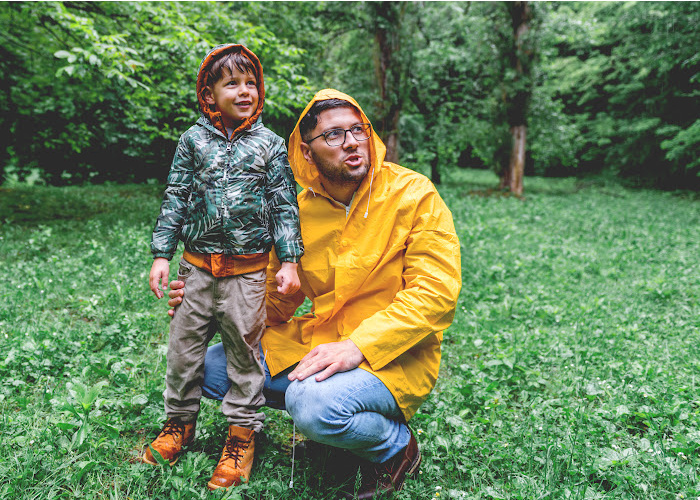It's crucial to know that students with autism and ADHD need special study strategies. Autism…

Can an Autistic Father Have a Normal Child? Exploring Genetics
As an autistic father, you may wonder if it’s possible to have a child who does not have autism. The answer is not straightforward, as genetics plays a significant role in the likelihood of passing on autism to offspring.
Autism and fatherhood can be a complex topic, but understanding how genetics influence the development of autism is crucial for family planning. In this section, we will explore the role of genetics in autism and how it affects the possibility of having a normal child despite being an autistic father.
Family planning can be a daunting task, especially when autism is involved. However, by learning more about genetics and autism, you can make informed decisions and better understand the chances of having a child who does not have autism. So, let’s dive into the science of autism and genetics!

Understanding Autism and Fatherhood
Being a father can be challenging, but when you are on the autism spectrum, the experience of fatherhood can be even more complex. As a father with autism, you may face unique challenges in understanding and responding to your child’s needs.
Parenting with autism can be an enriching experience, but to make it work, you need to understand how your autism affects your parenting skills. For example, some autistic parents struggle with sensory issues, which can make certain activities with their children difficult.
However, having autism doesn’t mean you can’t be a great father. In fact, some autistic individuals have unique strengths that can make them great parents, such as their attention to detail and ability to think outside the box.
If you are a father with autism, it’s essential to seek support and guidance from resources that are specifically tailored to your needs. Many organizations and support groups offer resources and advice for fathers with autism, ranging from parenting classes to counselling services.

Support for Fathers with Autism
Parenting with autism can be challenging, but there are many resources available to help you navigate the complexities of fatherhood. Here are some organizations and support groups that offer support and resources for fathers with autism:
- The National Autistic Society
- The Autism Dads Facebook Group
- The Autism Parenting Magazine
- The Asperger/Autism Network
These resources can provide you with a community of support and advice that can help you navigate the joys and challenges of fatherhood with autism.

The Role of Genetics in Autism
Autism spectrum disorder is a complex neurodevelopmental condition that affects communication, social interaction, and behaviour. While the exact causes of autism are still not fully understood, researchers have identified a strong genetic component to the disorder.
Studies have shown that genetics play a significant role in determining the likelihood of developing autism. According to research, if one identical twin has autism, the other twin has a 76-88% chance of also having the disorder. Similarly, if one sibling has autism, the likelihood of another sibling having the disorder is around 18.7%.
When it comes to autism and family planning, many parents are concerned about the risk of passing on the condition to their children. While the risk varies depending on the specific genetic makeup of the parents, studies have shown that autism has a strong familial inheritance pattern. Parents who have a child with autism are more likely to have another child with the condition, compared to the general population.
Research has identified multiple genes that may be associated with autism, although there is no single gene responsible for the disorder. It is believed that various genetic mutations and alterations can contribute to the development of autism. However, the inheritance patterns of these genetic mutations can be complex and vary widely among individuals and families.
While genetics play a crucial role in autism, it is important to note that other factors can also contribute to the development of the disorder. Environmental factors, such as prenatal exposure to toxins, can increase the risk of autism in some children. Additionally, epigenetic alterations, which modify the expression of genes, may also play a role in the development of autism.
Overall, the role of genetics in autism is complex and still not fully understood. While there is no guaranteed method for preventing autism in children of autistic parents, increased awareness and understanding of the genetic factors involved can help families make informed decisions about family planning.

Can Autism be Inherited from the Father?
When it comes to autism inheritance, there is a common belief that the mother is more likely to pass on the condition to their child, but what about the father? Research has shown that autism can be inherited from the father, but the risk is relatively low.
Autism inheritance patterns are complex as multiple genes are involved. It is estimated that up to 90% of autism cases are caused by genetic factors, with the remaining 10% attributed to environmental factors such as exposure to certain chemicals during pregnancy.
Studies show that if a father has autism, the risk of their child also having autism is approximately 2-6%. This is higher than the general population rate of 1-2%, but still relatively low. However, if the father is a carrier of a genetic variant associated with autism, the risk of passing on autism to their child increases to around 20-30%.
It’s important to note that autism inheritance is not straightforward and can vary depending on the specific genetic mutations involved. Some mutations have a higher likelihood of being passed down from the father, while others are more likely to come from the mother.
Autism and paternal inheritance can also be impacted by de novo mutations, meaning that the genetic change occurred spontaneously and was not inherited from either parent. De novo mutations are thought to account for around 10-30% of autism cases and can occur in either the mother’s or father’s genes.
Overall, while autism can be inherited from the father, the risk is relatively low. However, if you are concerned about the possibility of passing on autism to your child, it is recommended to speak with a genetic counsellor to better understand your specific situation and the potential risks involved.

The Impact of Other Factors
While genetics is a significant factor in the development of autism, it is not the only one. Environmental factors and epigenetics play a crucial role in determining whether a child will have autism or not.
Environmental factors such as exposure to toxins, infections during pregnancy, and premature birth can increase the risk of autism. Research has found that children born to mothers who were exposed to air pollution during pregnancy are more likely to develop autism. Similarly, infections during pregnancy, such as rubella or cytomegalovirus, can also increase the risk of autism.
Epigenetics, which refers to changes in gene expression that are not caused by alterations in the DNA sequence, can also impact the risk of developing autism. Research has found that certain environmental factors, such as diet and stress, can affect epigenetic changes that increase the risk of autism.
Other risk factors for autism include advanced parental age, low birth weight, and a history of complications during pregnancy or childbirth. However, it is important to note that having one or more of these risk factors does not mean that a child will definitely develop autism.
Overall, it is clear that genetics alone cannot fully explain the development of autism. Environmental factors and epigenetics play a crucial role in determining the risk of autism in children of autistic fathers. Therefore, a comprehensive approach to understanding autism and its potential inheritance is necessary for effective family planning and parenting.
Final Thoughts
Now that we have explored the topic of autism and fatherhood, it is important to consider some key takeaways. Firstly, it is possible for an autistic father to have a child who does not have autism. However, the likelihood is influenced by various genetic and environmental factors, which can make it challenging to predict.
It is essential to understand the role of genetics in autism and its potential impact on fatherhood. While certain genes are associated with autism, the inheritance patterns are complex and can vary widely. Therefore, it is recommended that families seek genetic counselling and discuss family planning options with their healthcare provider.
Additionally, it is important to recognize and address the challenges that fatherhood can bring for individuals with autism. Parenting skills may be impacted by the individual’s sensory processing differences, communication difficulties, and social interactions. It is essential to provide support and resources for parents on the autism spectrum, such as counselling services, parenting classes, and peer support groups.
Finally, it is important to remember that there is no one-size-fits-all solution when it comes to autism and fatherhood. Each family is unique, and the impact of autism on fatherhood will vary from person to person. It is essential to approach the topic with empathy, understanding, and an open mind. By doing so, we can support families in navigating the complexities of parenting with autism.

Frequently Asked Questions
Can an autistic father have a normal child?
Yes, it is possible for an autistic father to have a child who does not have autism. The likelihood of passing on autism depends on various genetic factors, which we will explore in this article.
What challenges do fathers with autism face?
Fatherhood can present unique challenges for individuals with autism. Parenting skills may be impacted by being on the autism spectrum, but with support and understanding, autistic fathers can navigate the journey of fatherhood successfully.
How does genetics play a role in autism?
Genetics plays a significant role in the development of autism spectrum disorders. Certain genes are associated with autism and can be passed down from parents to their children. However, it is important to note that autism is a complex condition with variations in inheritance patterns.
Can autism be inherited from the father?
There is evidence to suggest that autism can be inherited from the father. Studies and research have explored the likelihood of autism being passed down through paternal genes. Genetic mutations also play a role in autism inheritance.
What other factors contribute to autism?
Besides genetics, other factors such as environmental exposures and epigenetics can influence the development of autism. The interaction between genetics and the environment contributes to the overall risk of autism in children of autistic fathers.
Any final thoughts on autism and fatherhood?
Understanding the role of genetics in autism and its potential impact on fatherhood is crucial. It is important to seek support and guidance when navigating the complexities of parenting with autism. Remember, every individual and family’s experience is unique, and with the right resources, individuals with autism can thrive as fathers.



This Post Has 0 Comments